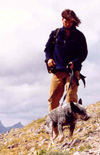 |
Development of the peripodial epithelium in Drosophila imaginal discs, Changes in peripodial and columnar cell morphology between 48 hr AED (After Egg Deposition) and 96 hr AED in the wing imaginal disc. |
Gerold Schubiger, a UW Biology professor, and Anne Sustar, a research technician in his laboratory, used groups of cells, called imaginal discs, in fruit fly larvae to provide an easily controlled system to study regeneration. Imaginal discs convert genetic information that determines the specific tissue into which the cells will develop in the adult fly. For example, leg discs form only adult legs and wing discs form only adult wings.
The exception is a very small number of cells in each disc that change their ultimate destiny, or fate, as the disc regenerates tissue. For example, instead of regenerating leg structures they form wing structures. Such fate changes are known as transdetermination, and they demonstrate that a few cells have development potential that is adaptable rather than firmly fixed, Schubiger said.
Read the full length version of this UWeek article published here.



 Together this dog and his trainer, Heath Smith, search for sign from grizzlies in Alberta, Canada. They are part of a novel and non-invasive animal tracking program started at the Center for Conservation Biology. This program is one of several at the department that conducts research to help save the lives of endangered species.
Every bit counts. Your choice to support the Department of Biology could make a big difference in how our future turns out.
Together this dog and his trainer, Heath Smith, search for sign from grizzlies in Alberta, Canada. They are part of a novel and non-invasive animal tracking program started at the Center for Conservation Biology. This program is one of several at the department that conducts research to help save the lives of endangered species.
Every bit counts. Your choice to support the Department of Biology could make a big difference in how our future turns out.